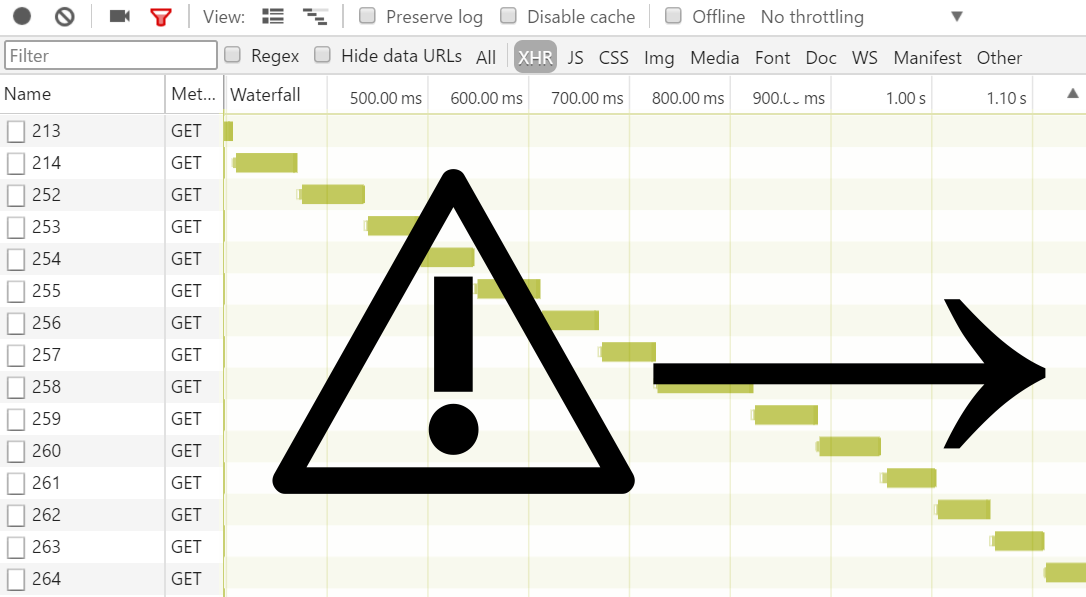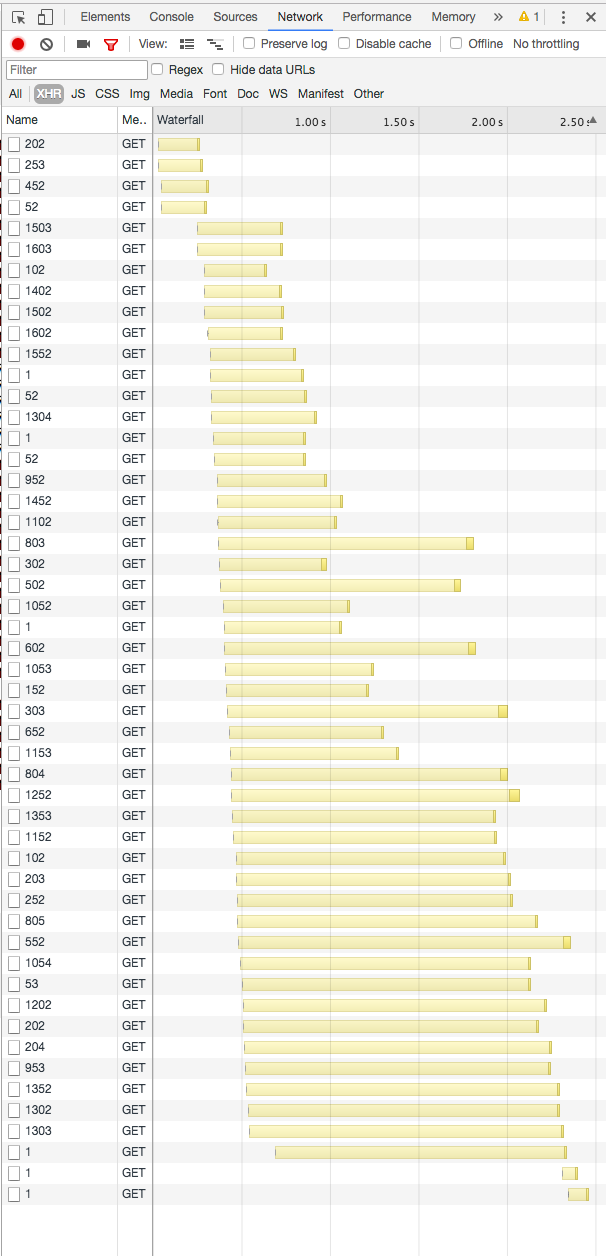Speed up your website using asynchron rest calls in javascript templates
Templateengine for asynchrouneus JSON requests.
Including the asjst is easy, just include this line anywhere in the header-section of the website.
<script src="js/asjst.js"></script>
| Framework | Compatibility | Hints |
|---|---|---|
| Npm jade | Yes | Check indention |
Since Servet specification 3.0 we could access the asjst.js via java-classpath. Requirement is a servlet-3.0 container and the web.xml-File having at least version 3.0 like this:
<web-app version="3.0"> ... </web-app>
Example:
<script id="foobar" type="text/asjstOrWhatever">
{{myFantasticField}}
</script>
<button onclick="
asjst.render( 'foobar',
{myFantasicField:'hello'},
function (htmlIncomming) {
alert(htmlIncomming); // alerts 'hello'
}
);">
Run
</button>
This is easy too, just like this
<script id="foobar" type="text/asjstOrWhatever">
{{for peoples}}
{{name}}
{{/for}}
</script>
<button onclick="
asjst.render( 'foobar',
{peoples:[{name:'Mike'},{name:'Marry'}]},
function (htmlIncomming) {
alert(htmlIncomming); // alerts 'Mike Marry'
}
);">
Run
</button>
The classic If/else/endifs:
<script id="foobar" type="text/asjstOrWhatever">
{{if age <= 12}}
Child
{{else if age <=18}}
Young person
{{else if age <= 24}}
Youngster
{{else}}
Adult
{{/if}}
</script>
<button onclick="
render( 'foobar',
{age: 19},
function (htmlIncomming) {
alert(htmlIncomming); // alerts 'Youngster'
}
);">
Run
</button>
Loading asynchroneus requests like this:
<script id="foobar" type="text/asjstOrWhatever">
{{load 'http://www.example.de/rest/abc.json'}}
I am
{{404}}
missing.
{{200}}
available!
{{/load}}
</script>
<button onclick="
asjst.render( 'foobar',
{},
function (htmlIncomming) {
alert(htmlIncomming); // alerts 'I am available!' on code 200 only.
}
);">
Run
</button>
Import also works, but be warned: Its hard to debug imports because the linenumbers differ between two different script-tags. Import actually do a hard-import and linenumbers are interpreted as in the original script-tag.
<script id="head" type="text/asjstOrWhatever">
MyHead
</script>
<script id="foot" type="text/asjstOrWhatever">
MyFoot
</script>
<script id="main" type="text/asjstOrWhatever">
{{import head}}
{{import foot}}
</script>
<button onclick="
asjst.render( 'main',
{},
function (htmlIncomming) {
alert(htmlIncomming); // alerts 'MyHead MyFoot'
}
);">
Run
</button>
| Tag | Meaning | Default | Exmaple | More informations |
|---|---|---|---|---|
| id | The ID of the script-tag, must be unique. | Missing by default | id="myTemplate" | This is HTML-Standard |
| type | The type of the contents, used to identify the intend of technical usage | Missing by default | type="text/asjst" | This is HTML-Standard, we do not special check for the value, asjst will render everything. |
| relative | For debug purpose only, while executing its possible to get a Stacktrace, this stacktrace contains linenumbers, to find the correct script-line for the error you have to declare the line, the opening-tag of the Script-Tag | 0 | relative="65" | This is a special attribute and will may be marked as invalid, anyway it may not be helpfull in production-environment. The default-value is wrong in every likelihood. |
| throws | For debug purpose only, the resulting javascript for the template is not executed and is thrown to the console to identify illegal javascript syntax. | Missing by default | throws="sure" | This is a special attribute and will may be marked as invalid, anyway it is prohibited in production environment. The pure existence of the attribute guides the engine to throw a exception, no matter what value it has. |
A list of variables used by asjst helps in compatiblity-reasons, they are defined directly under the global variable asjst.
| Variable Name | Meaning | Default value | Example | Hints |
|---|---|---|---|---|
| asjstDbg | Debug using the console | false | asjstDbg=true | True means that the script parses bitchy and kill as soon as possible if something is not "perfect". |
| varlbl | The variable-name of the buffer for the template. | crdxf | varlbl="alternate" | You must change the variable-name if a field in the json is like this name, otherwise, keep the name as it is. |
| indexVar | The variable name of the index-variable in for-loops. | index | indexVar="alterIndex" {{for list}} index is {{alterIndex}} {{/for}} | If a field in the list has the name "index", the fieldname is favored and the index-variable containing the index of the loop is not accessible anymore. |
| evenVar | The name of the variable used to identify if a loop-cycle is even and not odd. | even | {{for list}} {{even?'even':'odd'}} {{/for}} | If a field in the list has the name "even", the fieldname is favored and the even-variable containing the value to be a even cycle is not accessible anymore. |
| oddVar | The name of the variable used to identify if a loop-cycle is odd and not even. | odd | {{for list}} {{odd?'odd':'even'}} {{/for}} | If a field in the list has the name "odd", the fieldname is favored and the odd-variable containing the value to be a odd cycle is not accessible anymore. |
| ajaxOptions | The options to be used by default for ajax-operations. | {} | {crossDomain:true} | url, contentType, processData, dataType, error, success are set by asjst you can override the values here, but take care: to override url is not the best idea. |
| spf/epf | The joker-marker to find replaceables (start placeholder function/ end placeholder function) | 🎸/🎻 | {{import ticktack}}🎸1🎻 | Every import and load will create placeholders having an index surrouded by spf/epf; |
This section has been added because of further requirements. They are not an extension to the existing library!
By default a new variable without a scope is not possible by the framework. By tricky using {{for}} we can refer the contents of a variable to a new scope.
{{for [base:2, exponent:2]}}
{{base ^ exponent}}
{{/for}}
Templating is not a core functionality of the library but it is possible to template by using a tricky combination of {{for}} and {{load}}. Assuming we like to load a json to a reusable scope of html, we can do it like this:
<script id="loadtable" type="text/asjstOrWhatever">
{{load url}}
<table>
{{for it}}
<tr>
{{for [{jsonRow:it, cols:cols}]}}
{{for cols}}
<td>{{jsonRow[it]}}</td>
{{/for}}
{{/for}}
</tr>
{{/for}}
</table>
{{/load}}
</script>
...
{{for [{url: 'http://localhost/teachers', cols:['firstname','lastname']}]
{{import loadtable}}
{{/for}}

